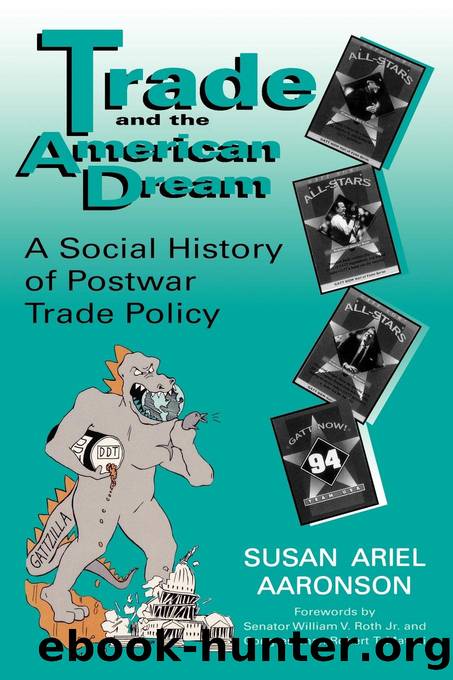Trade and the American Dream by Aaronson Susan Ariel;Roth William V. Jr.;Matsui Robert T.;

Author:Aaronson, Susan Ariel;Roth, William V., Jr.;Matsui, Robert T.; [Ariel Aaronson, Susan]
Language: eng
Format: epub
Publisher: University Press of Kentucky
Published: 2021-08-15T00:00:00+00:00
The NAFTA Debate
NAFTA raised the visibility of trade because it made the debate over trade easy to understand. Although the NAFTA raised questions about environmental protection, immigration, drug interdiction, and democracy, the bulk of the NAFTA debate focused on one questionâwould NAFTA create or destroy jobs? A surprisingly large number of Americans found that interesting. In November 1993, 68 percent of those polled by Gallup said they followed NAFTA news closely. This compared favorably with the 77 percent who followed the O.J. Simpson caseâthe trial of a famous football star on murder charges.37
The NAFTA debate was American politics at its best, creating some unusual coalitions in support and in opposition. For example, the NAFTA was endorsed by all of Americaâs living presidents, the U.S. Chamber of Commerce, the traditionally protectionist American Textile Manufacturers Institute, and the National Wildlife Federation. The Humane Society, Americans for Democratic Action, the National Consumers League, the National Family Farm Coalition, the United Auto Workers, the United Church of Christ, and the United Methodist Church joined to oppose the NAFTA. Opponents had a variety of concerns: many environmentalists feared that NAFTA would lead to greater environmental degradation, labor unions argued that factories would move jobs to Mexico, and progressives argued that the NAFTA was undemocratic and favored âbig business.â
However, President Clintonâs chief trade negotiator, Ambassador Mickey Kantor, diffused some of this opposition. As the U.S. Trade Representative Kantor negotiated side agreements on labor and the environment.38 Ultimately, NAFTA was endorsed by six environmental groups, including the Environmental Defense Fund, National Wildlife Federation, and the National Resources Defense Council, in the belief that border environmental conditions could be improved and that NAFTAâs provisions would not undermine environmental protection.39
Although the Clinton administration had won support from some environmentalists, NAFTA would prove to be a tough sell. Proponents launched a major public relations initiative. At the White House, Clinton recruited Chicago politician and lawyer William Daley and former Republican congressman and Brookings Institution scholar William Frenzel to build bipartisan congressional support. To show how important the Clinton administration viewed NAFTA, this last-minute effort was run out of the White House âwar room.â The administration organized a âProduct Dayâ at the White House, highlighting the big and small businesses that sell goods and services to Mexico. Proponents inside and outside government organized elite support to illustrate that business, foreign affairs, and community leaders were united in support of NAFTA. And they orchestrated public opinion by characterizing all NAFTA opponents as isolationists, fearful of change, and defeatist.
The turning point of the debate came when the administration was able to make Ross Perot the symbol of NAFTA opposition. On November 9, 1993, millions of Americans tuned into CNN (the Cable News Network) to watch Vice President Al Gore Jr. debate businessman H. Ross Perot on NAFTA. Gore not only calmly defended NAFTA, he seemed to link Perot, a man who made his fortune creating a high-tech industry (data processing), with old ideas and traditional fears about economic change.40 Gore linked support of free trade to the future.
Download
This site does not store any files on its server. We only index and link to content provided by other sites. Please contact the content providers to delete copyright contents if any and email us, we'll remove relevant links or contents immediately.
International Integration of the Brazilian Economy by Elias C. Grivoyannis(72639)
The Radium Girls by Kate Moore(11592)
Turbulence by E. J. Noyes(7682)
Nudge - Improving Decisions about Health, Wealth, and Happiness by Thaler Sunstein(7216)
The Black Swan by Nassim Nicholas Taleb(6739)
Rich Dad Poor Dad by Robert T. Kiyosaki(6157)
Pioneering Portfolio Management by David F. Swensen(6057)
Man-made Catastrophes and Risk Information Concealment by Dmitry Chernov & Didier Sornette(5629)
Zero to One by Peter Thiel(5468)
Secrecy World by Jake Bernstein(4363)
Millionaire: The Philanderer, Gambler, and Duelist Who Invented Modern Finance by Janet Gleeson(4069)
The Age of Surveillance Capitalism by Shoshana Zuboff(3968)
Skin in the Game by Nassim Nicholas Taleb(3956)
The Money Culture by Michael Lewis(3822)
Bullshit Jobs by David Graeber(3808)
Skin in the Game: Hidden Asymmetries in Daily Life by Nassim Nicholas Taleb(3714)
The Dhandho Investor by Mohnish Pabrai(3546)
The Wisdom of Finance by Mihir Desai(3512)
Blockchain Basics by Daniel Drescher(3312)
